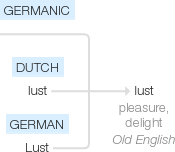Lust
Old English (also in the sense ‘pleasure, delight’), of Germanic origin; related to Dutch lust and German Lust .
wiktionary
From Middle English lust, from Old English lust(“lust, pleasure, longing”), from Proto-Germanic *lustuz. Akin to Old Saxon, Dutch lust, Old Frisian, Old High German, German Lust, Swedish lust, Danish lyst, Icelandic lyst, Old Norse losti, Gothic 𐌻𐌿𐍃𐍄𐌿𐍃( lustus), and perhaps to Sanskrit लष्(laṣ), लषति(laṣati, “to desire”) and Albanian lushë(“bitch, savage dog, promiscuous woman”), or to English loose. Confer list(“to please”), listless.
etymonline
lust (n.)
Old English lust "desire, appetite; inclination, pleasure; sensuous appetite," from Proto-Germanic *lustuz (source also of Old Saxon, Old Frisian, Dutch lust, German Lust, Old Norse lyst, Gothic lustus "pleasure, desire, lust"), abstract noun from PIE *las- "to be eager, wanton, or unruly" (source also of Latin lascivus "wanton, playful, lustful;" see lascivious).
In Middle English, "any source of pleasure or delight," also "an appetite," also "a liking for a person," also "fertility" (of soil). Specific and pejorative sense of "sinful sexual desire, degrading animal passion" (now the main meaning) developed in late Old English from the word's use in Bible translations (such as lusts of the flesh to render Latin concupiscentia carnis in I John ii:16); the cognate words in other Germanic languages tend to mean simply "pleasure." Masculine in Old English, feminine in modern German.
lust (v.)
c. 1200, "to wish, to desire eagerly," from lust (n.), absorbing or replacing the older verb, Old English lystan (see list (v.4)). In Middle English also "to please, delight." Sense of "to have an intense, especially sexual, desire (for or after)" is first attested 1520s in biblical use. Related: Lusted; lusting.
